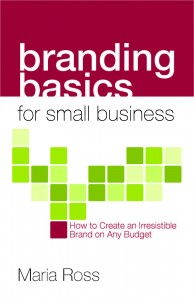 “I don’t need a brand. I’m a small business.”
“I don’t need a brand. I’m a small business.”
Have you ever said this to yourself? As a brand strategist, I’ve heard this one pretty often and it always amazes me. It makes me want to poke my eye out with a sharp stick.
There are tons of myths out there: branding is expensive, branding is only for big companies. Well, I’ve got some news for you. Brand is just another word for reputation. More than just a pretty logo, your brand is your core, your essence, and your promise to customers. It’s the value you deliver, to whom you deliver it and why you are the best choice. And if you think your reputation is not important in such a crowded marketplace, especially during these tough economic times, you are sadly mistaken.
Human beings need ways to sift through the barrage of information and make decisions. One way they do this is by slotting your company into a certain “file drawer” in their brain: are you the high-end, luxury craftsman? Are you the simple, dependable and affordable option? Where do you “play” in the market so that I can immediately tell if you will fit my needs?
Your brand strategy is what I like to call a “three-legged stool”. You communicate your brand promise to your customers not just visually via a logo, but also verbally through your elevator pitch and website copy, and experientially as well – do you deliver what you actually promise?
Here are three high-profile branding lessons from “the big guys” that small businesses can learn from. You will see that these examples have nothing to do with marketing budgets or slick ads. They are about living your brand and following through on what you promise:
- The Good: Virgin America. This airline uses every possible customer touch point – signage, emails, social media, and even the in-flight safety video – as an opportunity to consistently convey their irreverent, smart, fun and modern brand. As a small business owner, remember that your brand is more than just slick ads or cool websites. It’s about a 360 degree experience as well. Are you taking advantage of every single customer interaction, big or small, and communicating a consistent brand personality so that they not only remember you, but talk about you to others? Hint: think about little things like email auto-replies, email signatures, shipment packaging and outgoing voice mail messages.
- The Bad: Netflix. First, they sent their customer base into a tizzy by charging more (and separately) for DVD mailings and streaming movies. Then, they eroded strong brand goodwill further by confusing customers with a new brand name – Qwikster – and inconveniencing customers by making them use two websites instead of just one. The CEO’s attempt to explain the moves after the fact led to further brand confusion and added fuel to the fire of customer outrage. Small business owners planning to expand services or add to the bottom line need to make sure that they clearly communicate additional value and don’t anger loyal customers in the process. What is your communication plan for major changes? Concise, clear and well-planned communications are essential if you want to protect a brand that you’ve worked hard to build.
- The Ugly: Tiger Woods. Yes, Tiger himself was a brand two years ago that stood for success, consistency and family. Companies paid him millions to associate his brand with their product. His infidelities not only cost him sponsorship money, but they created a brand consistency problem – i.e., “identity crisis” he’s yet to bounce back from, because he wasn’t actually who his brand said he was. As a small business owner, are you authentically delivering on your promise to the consumer and “walking your brand talk”? If you say customer service is your number one priority, how is that reflected in customer support wait times or how easy your eCommerce site is to use? Customers will eventually see through false brand promises and earning their trust again will be near impossible.
In short, whatever the size of your business, you do need to consciously think about your brand and how you want to be known. And then, you need to be consistent and stay in character.
Have you taken the time to think through your brand? How do you want to be known? Do you think it is important even for very small businesses? We’d love to hear from you in the comments below.

